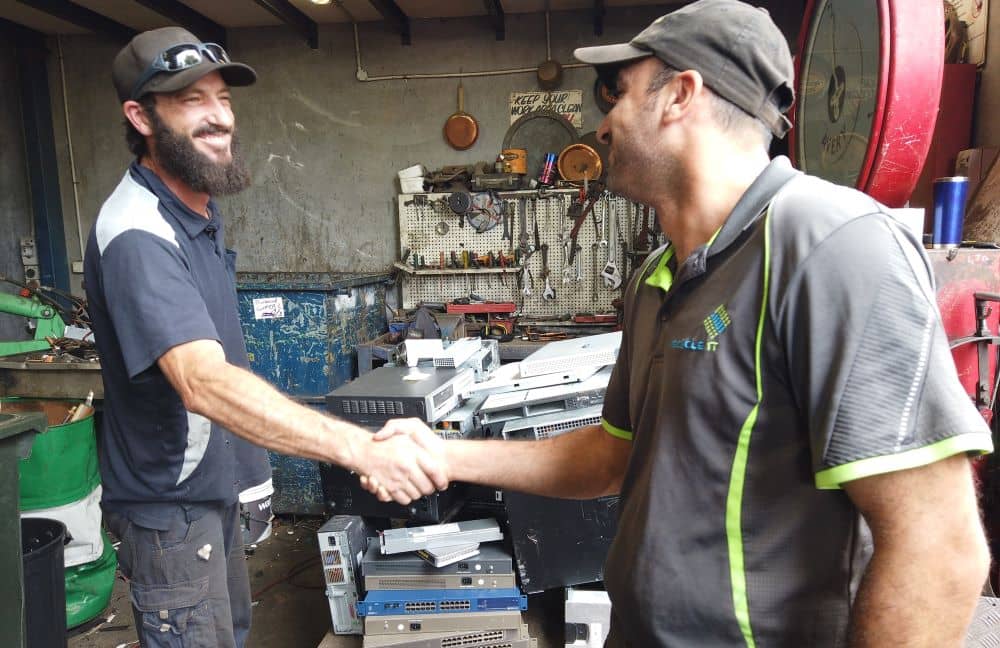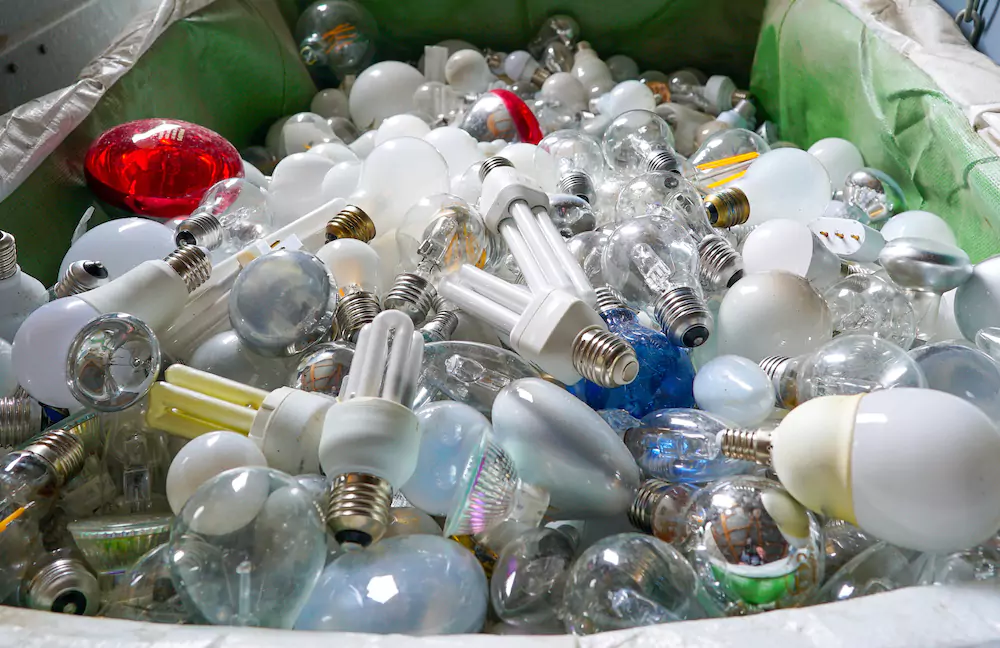Most light bulbs can be disposed of in the general waste bin. Depending on the type of bulb, many local councils also offer special facilities to recycle light bulbs, but not all bulbs are recyclable.
With nearly 30 years’ experience in the recycling industry, I have created this comprehensive guide on how to responsibly discard various types of light bulbs, from incandescent to LED, and provided expert insights into the latest developments in this space.
Key Takeaways
- Disposal Methods: Incandescent and Halogen bulbs go to general waste; CFLs and Fluorescent bulbs require hazardous waste disposal; LED bulbs can be disposed of in e-waste.
- Recycling Options: No recycling for Incandescent and Halogen bulbs; CFLs and Fluorescent bulbs can be recycled at special facilities; LED bulbs at e-waste facilities.
- Safety Measures: Wrap bulbs in newspaper before disposal for safety.
- Local Councils: Check local council websites for specific recycling instructions.
- Recent Advancements: Recent developments include growth in LED recycling markets and innovative recycling technologies.
How to Dispose of and Recycle Light Bulbs
| Light Bulb Recycling & Disposal Guide for Perth | ||||
|---|---|---|---|---|
| Type of Bulb | Lifespan | Energy Efficiency | Disposal Methods | Recycling Options |
| Incandescent | Short | Low | General waste | None |
| CFL | Medium | High | Hazardous waste | Special facilities |
| Fluorescent | Long | High | Hazardous waste | Special facilities |
| Halogen | Medium | Moderate | General waste | None |
| LED | Long | Very High | E-waste | E-waste facilities |
Incandescent Bulbs
- Disposal:
- Can be disposed of in normal rubbish bins.
- For safety, wrap in newspaper or other materials before disposal.
- Recycling:
Compact Fluorescent Lamps (CFLs)
- Disposal:
- Should not be thrown away with household rubbish due to mercury content.
- Recycling:
- Check with local councils for specific disposal instructions.
- Some councils accept CFLs at offices; others require disposal at waste depots.
- IKEA offers CFL recycling services.
Fluorescent Bulbs
- Disposal:
- Not suitable for household rubbish due to mercury content.
- Recycling:
- Check with local council facilities for disposal instructions.
- Some councils accept fluorescent bulbs at recycling centres or offices.
- More information can be found on local council websites.
Halogen Bulbs
- Disposal:
- Can be disposed of in regular rubbish bins.
- For safety, wrap in newspaper or other materials before disposal.
- Recycling:
- Some councils and recycling centres may accept halogen bulbs.
- Check local council websites for specific options.
LED Bulbs
- Disposal:
- Safe for regular rubbish bins, but recycling is recommended.
- Recycling:
- Your local council may include LED bulbs in their recycling programs.
- Check with local councils for drop-off options in your area.
How to Determine Light Bulb Type
If you are unsure what type of bulb you have, you can use the below steps to figure this out:
- Examine the Label: Many bulbs have a label or etching on the base or side, providing information such as wattage, brand, and type (e.g., LED, CFL, incandescent).
- Check for Heat Emission: Incandescent bulbs typically get hot quickly, while LED and CFL bulbs stay relatively cool.
- Look at the Color Temperature: LEDs usually offer a range of color temperatures from warm (yellowish) to cool (bluish) light. Incandescents generally emit a warm light.
- Observe the Bulb’s Reaction Time: LEDs light up instantly, whereas CFLs may take a moment to reach full brightness.
- Inspect the Bulb’s Construction: LEDs often have a heat sink at the base, CFLs have a twisted or spiral design, and incandescent bulbs have a simple, classic bulb shape with a visible filament.
- Consult the Manufacturer’s Website or Packaging: If available, refer to the original packaging or the manufacturer’s website for specific product details.
Recycling Programs for Each State
Below, I have compiled the recycling initiatives currently being run in each state:
- New South Wales (NSW): The NSW government provides recycling information through various local councils and the “Waste Less, Recycle More” initiative.
- Victoria (VIC): Sustainability Victoria offers guidance on recycling, including a dedicated section on how to manage and recycle waste effectively.
- Queensland (QLD): The Queensland government has various resources, including local council services, to help residents understand recycling options.
- Western Australia (WA): The WA government provides recycling information through the Waste Authority and local council services.
- South Australia (SA): Green Industries SA and local councils provide extensive recycling information, including the popular ‘Which Bin’ campaign.
- Tasmania (TAS): The Tasmanian government and local councils provide resources for recycling, focusing on reducing waste and recycling correctly.
- Australian Capital Territory (ACT): The ACT government offers a dedicated recycling and waste guide, including information about the Container Deposit Scheme.
- Northern Territory (NT): The NT government provides recycling information, though services are more limited compared to other states.
Specific Perth Council Recycling Laws
Below are the waste and recycling law pages for each of the major councils in the Perth metropolitan area.
For your individual council’s recycling laws, click the relevant link:
- City of Perth
- City of Stirling
- City of Joondalup
- City of Fremantle
- City of Canning
- City of Mandurah
- City of Rockingham
- City of Swan
- City of Wanneroo
- City of Armadale
- City of Belmont
- City of Kwinana
- City of Gosnells
- City of Melville
- City of Nedlands
- City of South Perth
- City of Subiaco
- City of Claremont
- City of Bayswater
- Town of Victoria Park
Our Recycling Process

Business at Collins Recycling.
Myself and my team have work hard to stay on the forefront of all recycling processes. As such, we have forged a reputation as the leading e-waste recycling team in Perth.
Here is our process:
- Collection: We gather e-waste from various sources, ensuring a comprehensive approach to waste management.
- Sorting: Different types of e-waste, including metals and plastics, are sorted to streamline the recycling process.
- Processing: The sorted e-waste undergoes processing where materials are broken down for recycling.
- Purification: Metals and other materials are purified to ensure they meet quality standards for reuse.
- Repurposing: The recycled materials are then repurposed into new products, completing the recycling cycle.
For more specific details on how to recycle light bulbs or to organise collection, visit our e-waste page.
Recent Developments in Light Bulb Recycling
Positively, there have been many exciting developments recently in terms of how we dispose of and recycle light bulbs, including:
- Rapid Growth in LED Recycling Market: The global market for recycling LED lights and bulbs is projected to grow significantly, driven by the increasing popularity of energy-efficient LEDs and enhanced electronic waste management practices.
- Advancements in Recycling Technology: Innovations such as smart bins and advanced e-waste sorters are revolutionising waste management, offering more efficient and effective recycling solutions.
- Australia’s Commitment to Circular Waste Economy: Australia is playing a pivotal role in the global effort to develop a circular waste economy, with initiatives like the National Plastics Plan 2021 and support for an international treaty on plastic pollution.
- Government Support for Recycling Initiatives: The Australian Government has allocated significant funding to enhance plastic recycling technologies and promote awareness, demonstrating its commitment to sustainable waste management.
- Enhanced Recycling Infrastructure: There is an increased focus on establishing infrastructure for the recycling of various light bulbs, including those containing hazardous materials like mercury.
Summary
In this comprehensive guide, I’ve provided you with the knowledge you need to responsibly dispose of different types of light bulbs in Perth. From incandescent to LED, I’ve covered the disposal methods and recycling options. Plus, I’ve shared my tips on how to identify the type of bulb you have.
Be sure to check your local council’s recycling laws to ensure you’re following the right procedures for your area. I’ve provided links to major Perth councils for your convenience, making it easier than ever to stay compliant with local regulations.
Exciting developments are happening in the world of light bulb recycling, with LED recycling on the rise and innovative technologies improving waste management. Australia is committed to a circular waste economy, and government support for recycling initiatives is stronger than ever. By responsibly disposing of your light bulbs, you’re contributing to a more sustainable future. Get involved today!








